Claude3 is released, will it completely surpass GPT-4?
Just now, Anthropic announced the launch of the Claude 3 model series, which sets a new industry benchmark across a wide range of cognitive tasks. The range includes three state-of-the-art models, arranged in increasing order of capability: Claude 3 Haiku, Claude 3 Sonnet and Claude 3 Opus. Each subsequent model offers increasingly powerful performance, allowing users to choose the best balance of intelligence, speed and cost for their specific applications.
Opus and Sonnet are now available in claude.ai and the Claude API, with the latter now fully available in 159 countries. Haiku will be available soon.
Claude 3 Model Series
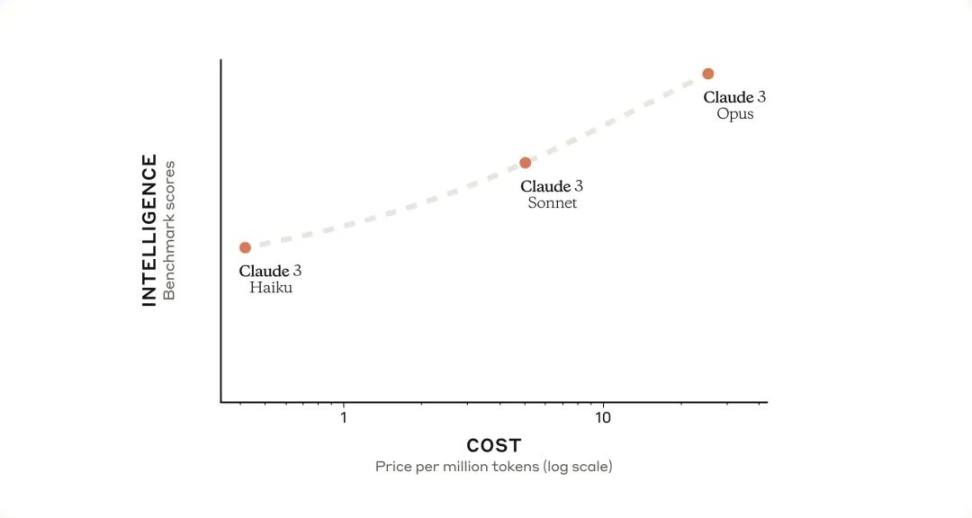
#The new standard of intelligence
Opus, Anthropic’s most intelligent model in most common AI systems Excellent performance on assessment benchmarks, including undergraduate level expert knowledge (MMLU), postgraduate level expert reasoning (GPQA), basic mathematics (GSM8K), etc. It demonstrates near-human-level understanding and fluency on complex tasks, leading the frontier of general intelligence.
Claude 3 models demonstrate strong capabilities in analysis and prediction, detail in content creation, code generation, and conversational delivery in non-English languages such as Spanish, Japanese, and French.
Here's how the Claude 3 model compares to its Anthropic counterparts on multiple capability benchmarks[1]:
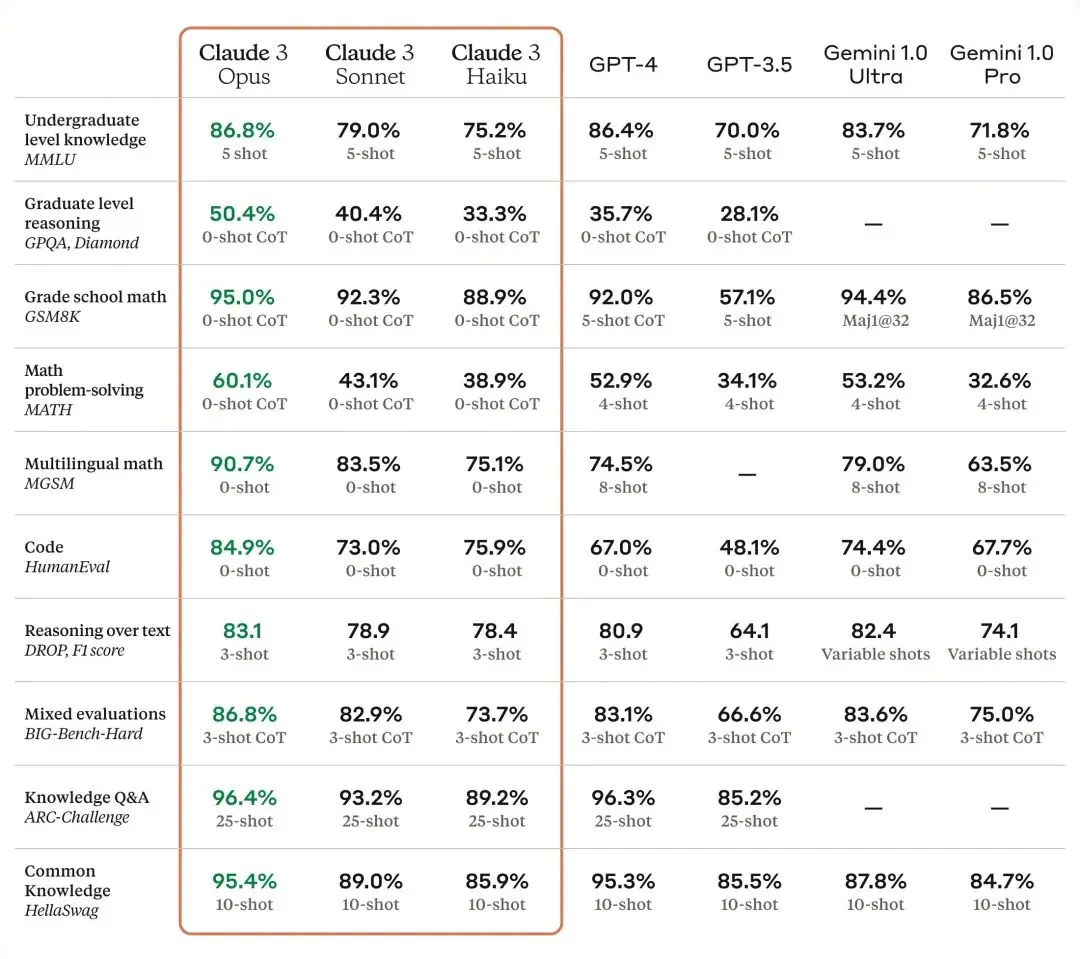
Near-instant results
## The #Claude 3 model can support live customer chat, autocomplete, and data extraction tasks where responses must be immediate and real-time. In the field of intelligence, Haiku is an extremely cost-effective model with the fastest speed on the market. It was able to decipher an information-dense arXiv research paper (~10,000 tokens) containing charts and graphs in less than three seconds. Anthropic will further optimize its performance in the near future, and Haiku's performance will also be improved. For the vast majority of workloads, Sonnet is more than 2x faster than Claude 2 and Claude 2.1, and has a higher level of intelligence. It excels at tasks that require fast responses, such as knowledge retrieval or sales automation. The Opus is similar in speed to the Claude 2 and 2.1, but with a higher level of intelligence. Powerful Visual CapabilitiesClaude 3 models have sophisticated visual capabilities on par with other leading models. They can handle a variety of visual formats, including photos, charts, graphs, and technical diagrams. Anthropic is particularly excited to offer this new modality to enterprise customers, some of whom have as much as 50% of their knowledge bases encoded in various formats such as PDFs, flowcharts, or presentation slides.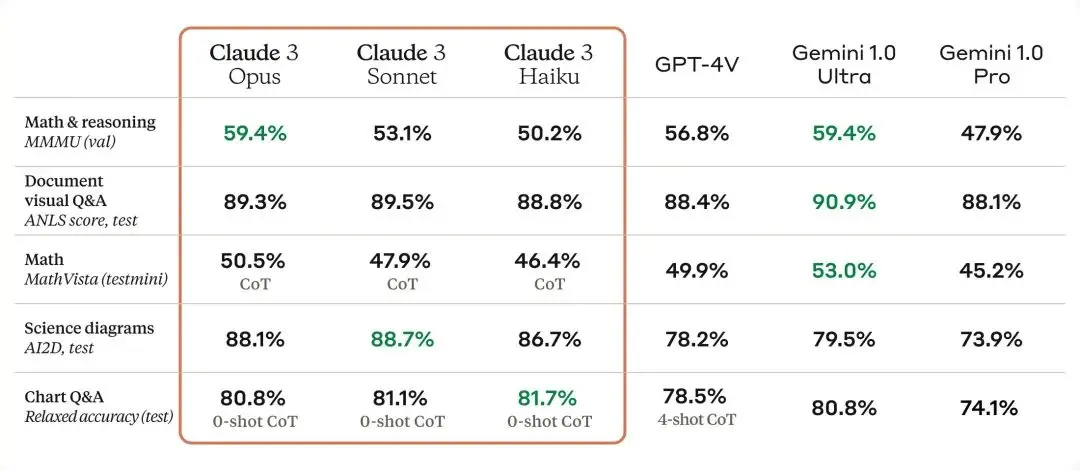
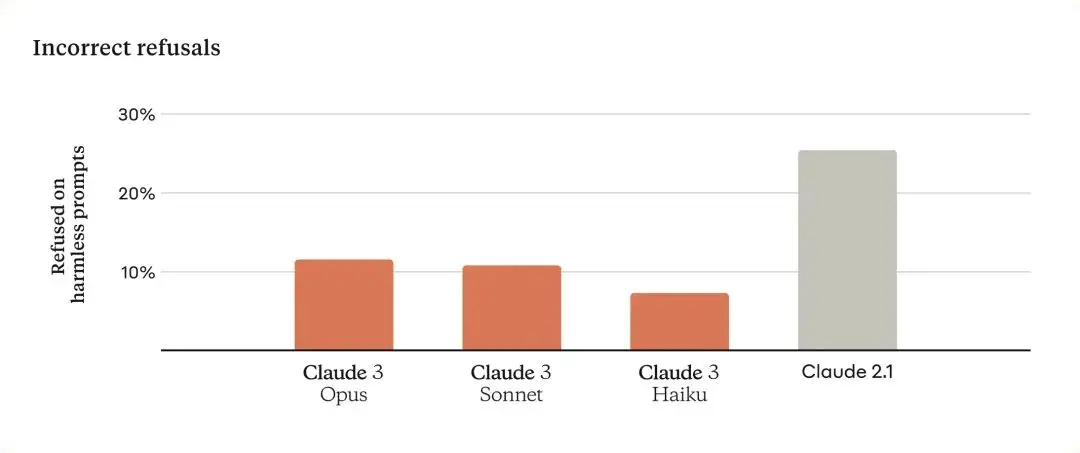
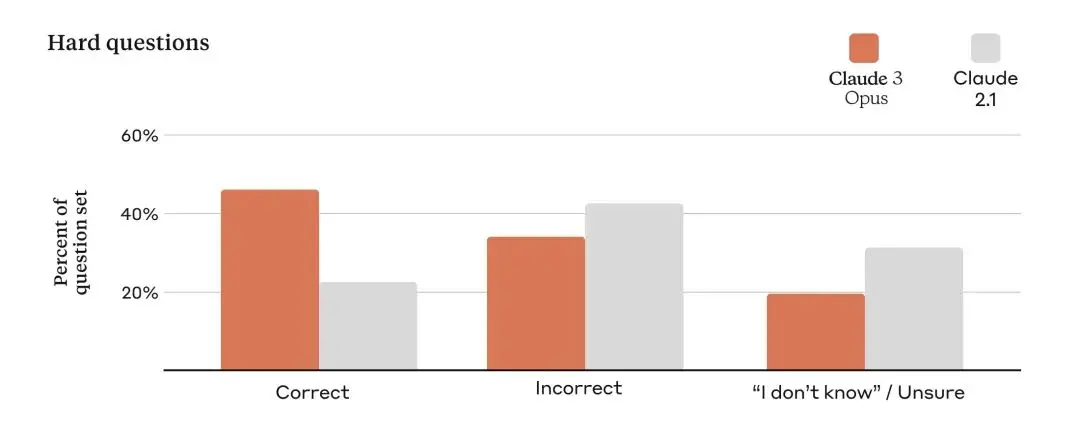
Claude 3 Opus not only achieves near-perfect recall, exceeding 99% accuracy, but in some cases it even identifies the evaluations themselves by identifying "needle" sentences that appear to have been artificially inserted into the original text limitations.
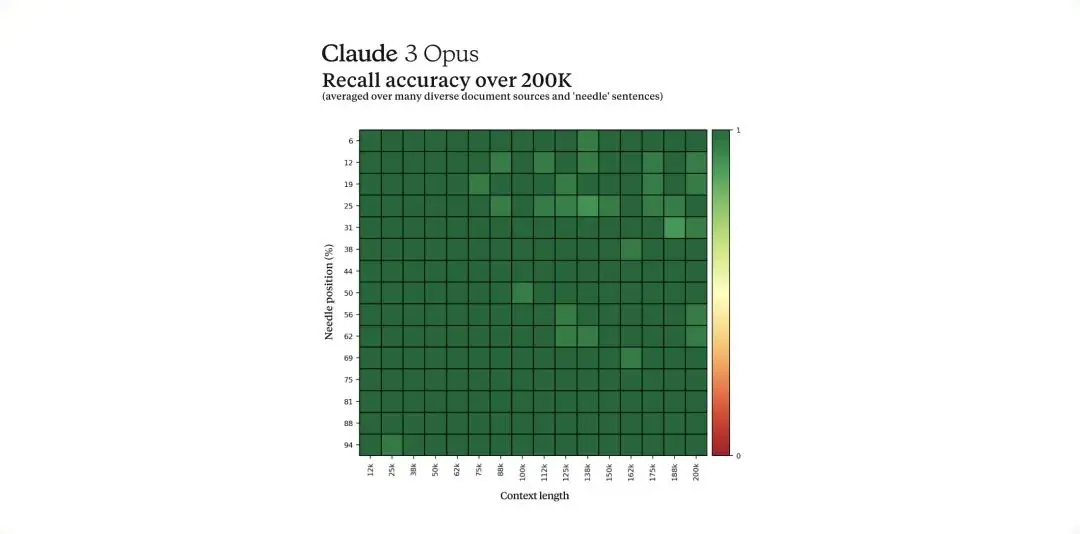
Responsible Design
Anthropic developed the Claude 3 series of models to deliver dependability alongside capability. Anthropic has several dedicated teams tracking and mitigating a variety of risks, from misinformation and CSAM to bioabuse, election interference, and autonomous replication skills. Anthropic continues to develop methods, such as Constitutional AI, to improve the security and transparency of Anthropic's models, and to adjust Anthropic's models to mitigate privacy concerns that may arise from new modalities.
Addressing bias in increasingly complex models is an ongoing effort, and Anthropic is making progress with this new release. As shown in the model card, Claude 3 shows less bias than Anthropic's previous model according to the Bias Question Answering Benchmark (BBQ). Anthropic remains committed to advancing technology that reduces bias and promotes greater neutrality in models, ensuring they are not biased toward any particular partisan position.
While the Claude 3 model series offers improvements in biological knowledge, network-related knowledge, and autonomy compared to previous models, it remains at AI Safety Level 2 (according to Anthropic’s Responsible Scaling Policy) ASL-2). Anthropic’s red team assessment (conducted in line with Anthropic’s White House commitments and the 2023 U.S. Executive Order) concluded that current models have negligible potential for catastrophic risk. Anthropic will continue to closely monitor future models to assess how close they are to the ASL-3 threshold. Additional security details are provided on the Claude 3 model card.
Easier to use
Claude 3 model performs better at following complex multi-step instructions. They are particularly good at following brand voice and response guidelines and developing customer-facing experiences that users can trust. Additionally, the Claude 3 model performs better at generating popular structured outputs, such as JSON formats—making it easier to coach Claude for use cases such as natural language classification and sentiment analysis.
Model Details
Claude 3 Opus is Anthropic’s smartest model, showing the best performance on the market on highly complex tasks. It flows brilliantly in open-ended prompts and unseen situations, with human-like understanding. Opus shows Anthropic the limits of what is possible with generative AI.
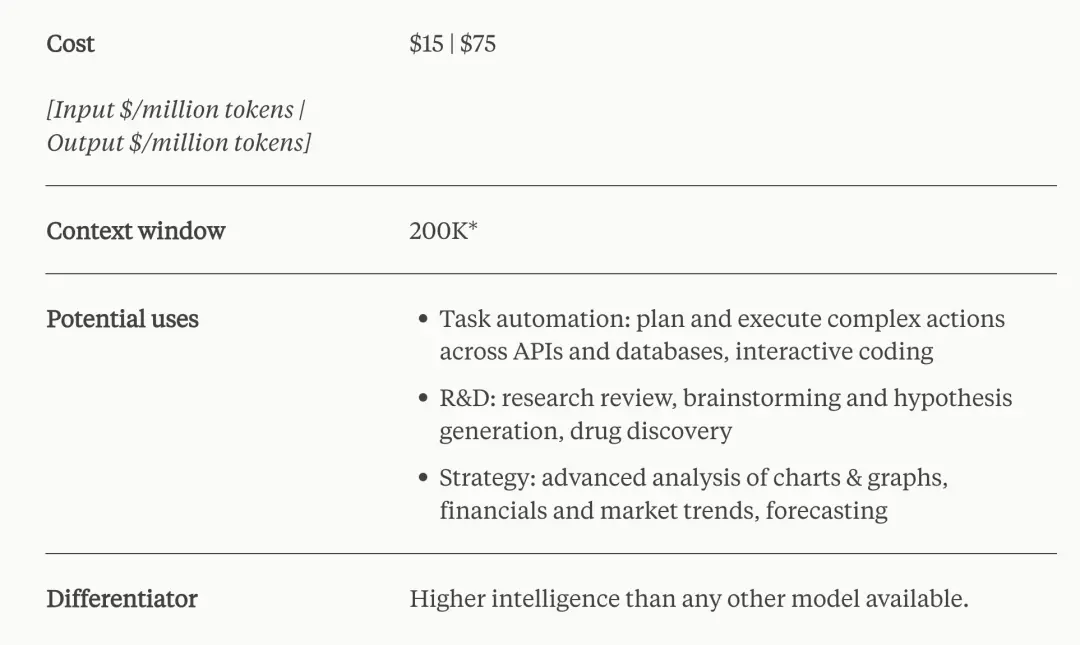
Claude 3 Sonnet strikes the ideal balance between intelligence and speed—especially for enterprise workloads. It delivers powerful performance at a lower cost than its peers and is designed for high durability for large-scale AI deployments.
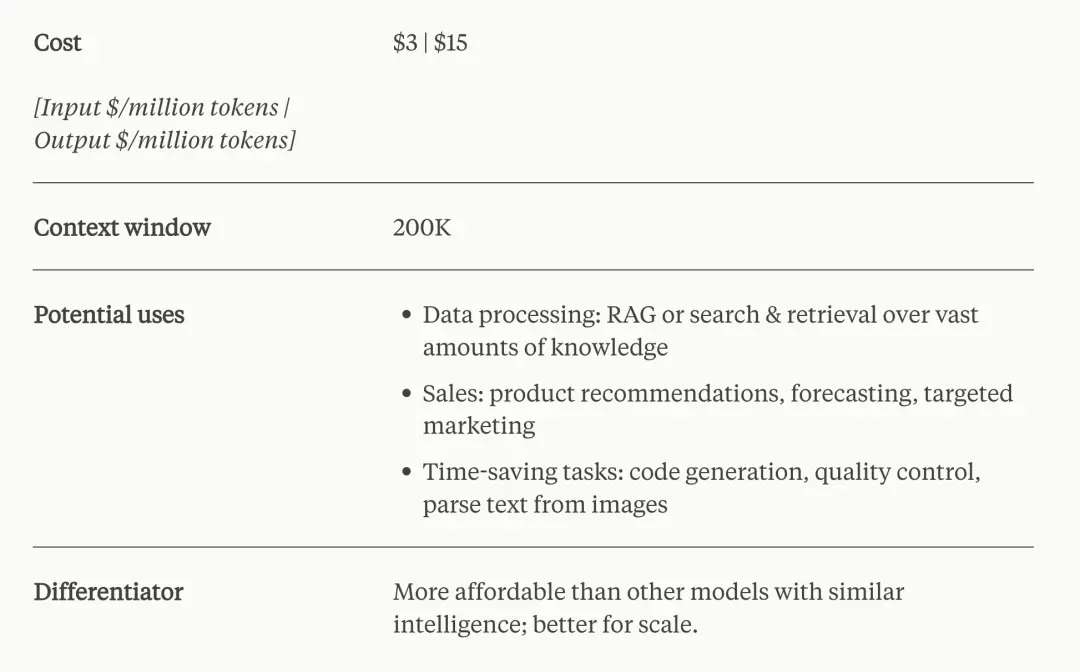
Claude 3 Haiku is Anthropic’s fastest and most compact model, allowing for near-instant response. It answers simple queries and requests with unparalleled speed. Users will be able to build seamless AI experiences that simulate human interactions.
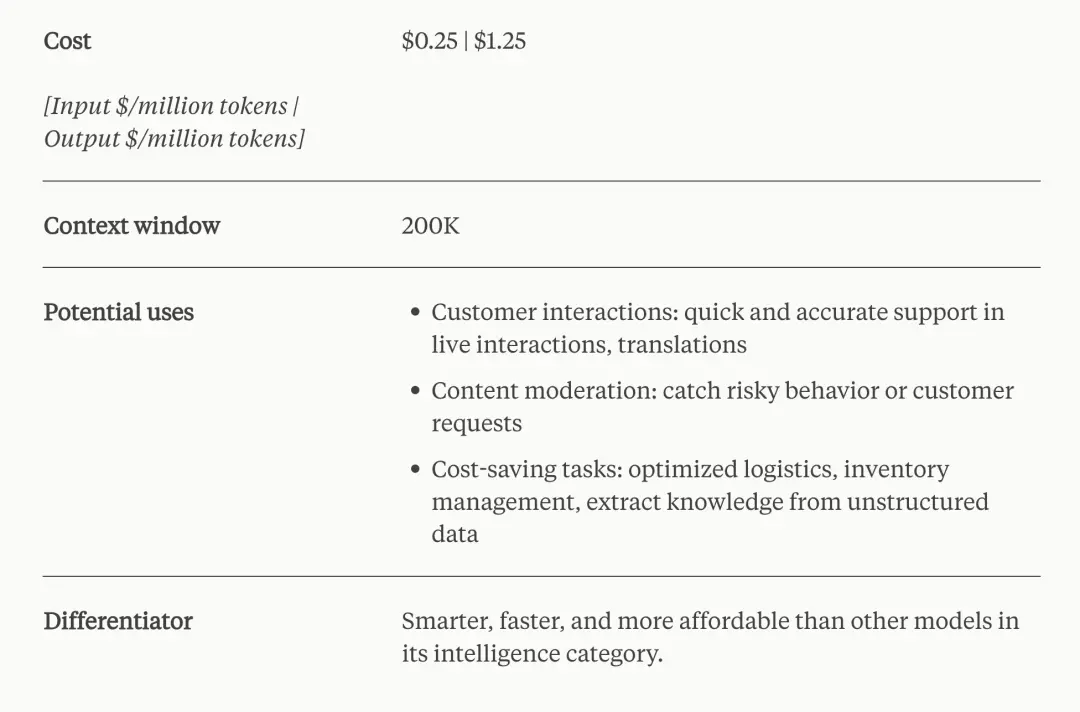
Model Availability
Opus and Sonnet are available today in Anthropic’s API, which is now generally available and developers can sign up and get started today Use these models. Haiku will be available soon. Sonnet is powering the free experience on claude.ai, while Opus is available for Claude Pro subscribers.
Sonnet is also available through Amazon’s Bedrock and Google Cloud’s Vertex AI Model Garden, with Opus and Haiku coming soon.
Smarter, Faster, Safer
Anthropic believes model intelligence is far from reaching its limits and plans to frequently update the Claude 3 model series over the next few months. Anthropic is also pleased to release a series of features to enhance the capabilities of Anthropic models, especially for enterprise use cases and large-scale deployments. These new features will include tool usage (also known as function calls), interactive coding (also known as REPL), and more advanced agent capabilities.
The above is the detailed content of Claude3 is released, will it completely surpass GPT-4?. For more information, please follow other related articles on the PHP Chinese website!

Hot AI Tools

Undresser.AI Undress
AI-powered app for creating realistic nude photos

AI Clothes Remover
Online AI tool for removing clothes from photos.

Undress AI Tool
Undress images for free

Clothoff.io
AI clothes remover

AI Hentai Generator
Generate AI Hentai for free.

Hot Article

Hot Tools

Notepad++7.3.1
Easy-to-use and free code editor

SublimeText3 Chinese version
Chinese version, very easy to use

Zend Studio 13.0.1
Powerful PHP integrated development environment

Dreamweaver CS6
Visual web development tools

SublimeText3 Mac version
God-level code editing software (SublimeText3)

Hot Topics
 1378
1378
 52
52
 What are the top ten virtual currency trading platforms? Ranking of the top ten virtual currency trading platforms in the world
Feb 20, 2025 pm 02:15 PM
What are the top ten virtual currency trading platforms? Ranking of the top ten virtual currency trading platforms in the world
Feb 20, 2025 pm 02:15 PM
With the popularity of cryptocurrencies, virtual currency trading platforms have emerged. The top ten virtual currency trading platforms in the world are ranked as follows according to transaction volume and market share: Binance, Coinbase, FTX, KuCoin, Crypto.com, Kraken, Huobi, Gate.io, Bitfinex, Gemini. These platforms offer a wide range of services, ranging from a wide range of cryptocurrency choices to derivatives trading, suitable for traders of varying levels.
 How to adjust Sesame Open Exchange into Chinese
Mar 04, 2025 pm 11:51 PM
How to adjust Sesame Open Exchange into Chinese
Mar 04, 2025 pm 11:51 PM
How to adjust Sesame Open Exchange to Chinese? This tutorial covers detailed steps on computers and Android mobile phones, from preliminary preparation to operational processes, and then to solving common problems, helping you easily switch the Sesame Open Exchange interface to Chinese and quickly get started with the trading platform.
 Do I need to use flexbox in the center of the Bootstrap picture?
Apr 07, 2025 am 09:06 AM
Do I need to use flexbox in the center of the Bootstrap picture?
Apr 07, 2025 am 09:06 AM
There are many ways to center Bootstrap pictures, and you don’t have to use Flexbox. If you only need to center horizontally, the text-center class is enough; if you need to center vertically or multiple elements, Flexbox or Grid is more suitable. Flexbox is less compatible and may increase complexity, while Grid is more powerful and has a higher learning cost. When choosing a method, you should weigh the pros and cons and choose the most suitable method according to your needs and preferences.
 How to calculate c-subscript 3 subscript 5 c-subscript 3 subscript 5 algorithm tutorial
Apr 03, 2025 pm 10:33 PM
How to calculate c-subscript 3 subscript 5 c-subscript 3 subscript 5 algorithm tutorial
Apr 03, 2025 pm 10:33 PM
The calculation of C35 is essentially combinatorial mathematics, representing the number of combinations selected from 3 of 5 elements. The calculation formula is C53 = 5! / (3! * 2!), which can be directly calculated by loops to improve efficiency and avoid overflow. In addition, understanding the nature of combinations and mastering efficient calculation methods is crucial to solving many problems in the fields of probability statistics, cryptography, algorithm design, etc.
 Top 10 virtual currency trading platforms 2025 cryptocurrency trading apps ranking top ten
Mar 17, 2025 pm 05:54 PM
Top 10 virtual currency trading platforms 2025 cryptocurrency trading apps ranking top ten
Mar 17, 2025 pm 05:54 PM
Top Ten Virtual Currency Trading Platforms 2025: 1. OKX, 2. Binance, 3. Gate.io, 4. Kraken, 5. Huobi, 6. Coinbase, 7. KuCoin, 8. Crypto.com, 9. Bitfinex, 10. Gemini. Security, liquidity, handling fees, currency selection, user interface and customer support should be considered when choosing a platform.
 Top 10 cryptocurrency trading platforms, top ten recommended currency trading platform apps
Mar 17, 2025 pm 06:03 PM
Top 10 cryptocurrency trading platforms, top ten recommended currency trading platform apps
Mar 17, 2025 pm 06:03 PM
The top ten cryptocurrency trading platforms include: 1. OKX, 2. Binance, 3. Gate.io, 4. Kraken, 5. Huobi, 6. Coinbase, 7. KuCoin, 8. Crypto.com, 9. Bitfinex, 10. Gemini. Security, liquidity, handling fees, currency selection, user interface and customer support should be considered when choosing a platform.
 What are the safe and reliable digital currency platforms?
Mar 17, 2025 pm 05:42 PM
What are the safe and reliable digital currency platforms?
Mar 17, 2025 pm 05:42 PM
A safe and reliable digital currency platform: 1. OKX, 2. Binance, 3. Gate.io, 4. Kraken, 5. Huobi, 6. Coinbase, 7. KuCoin, 8. Crypto.com, 9. Bitfinex, 10. Gemini. Security, liquidity, handling fees, currency selection, user interface and customer support should be considered when choosing a platform.
 Recommended safe virtual currency software apps Top 10 digital currency trading apps ranking 2025
Mar 17, 2025 pm 05:48 PM
Recommended safe virtual currency software apps Top 10 digital currency trading apps ranking 2025
Mar 17, 2025 pm 05:48 PM
Recommended safe virtual currency software apps: 1. OKX, 2. Binance, 3. Gate.io, 4. Kraken, 5. Huobi, 6. Coinbase, 7. KuCoin, 8. Crypto.com, 9. Bitfinex, 10. Gemini. Security, liquidity, handling fees, currency selection, user interface and customer support should be considered when choosing a platform.



